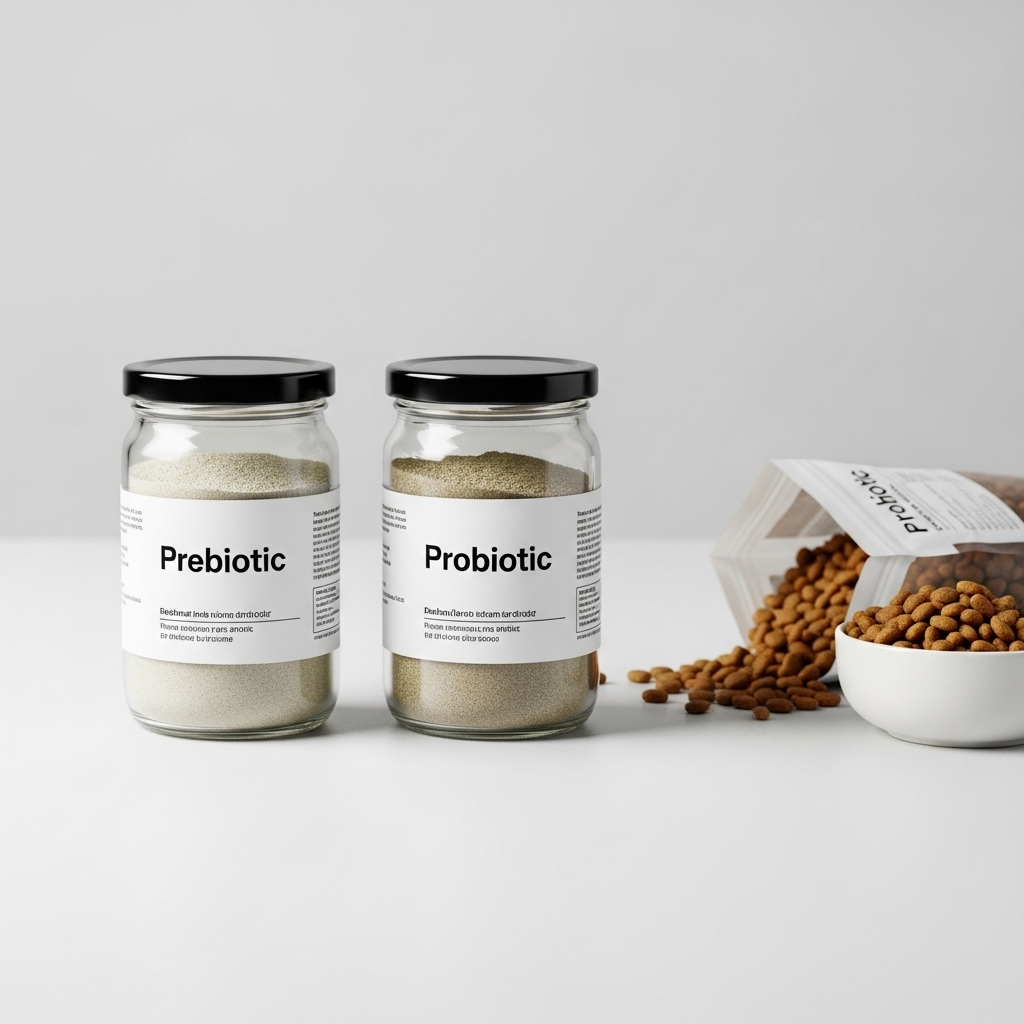Prebiotics vs Probiotics for Cats: What’s the Difference?

As a cat owner you may have seen “prebiotics” and “probiotics” on pet food labels or supplement shelves, but what exactly do they do and which one is right for your cat? This article explains the key differences, potential benefits and risks, how to choose a safe product, and when to talk to your veterinarian. The goal is practical, trustworthy guidance to help you make an informed decision about supporting your cat’s gut health.
What are probiotics?
Probiotics are live beneficial microorganisms (usually bacteria or yeast) that, when given in adequate amounts, may support a healthy balance of microbes in the digestive tract. Common probiotic groups used in cats include Lactobacillus species, Bifidobacterium species, Enterococcus faecium, and the yeast Saccharomyces boulardii. Probiotics can help with digestion, short-term diarrhea, and restoring microbes after antibiotic use, though results vary by strain, dose, and the individual cat.
What are prebiotics?
Prebiotics are non-digestible fibers or carbohydrates that feed beneficial gut microbes. Examples include inulin, fructooligosaccharides (FOS), galactooligosaccharides (GOS), and resistant starches. Prebiotics are not living organisms — they act as food to encourage growth of certain bacteria already present in the gut.
Key differences: prebiotics vs probiotics
- Nature: Probiotics are live microbes; prebiotics are non-digestible nutrients that feed microbes.
- Action: Probiotics introduce beneficial strains directly; prebiotics support the growth of existing beneficial microbes.
- Onset: Probiotics may produce more immediate effects by adding organisms; prebiotics often have a slower, indirect effect as the microbial community shifts.
- Use together: Many products combine both (called synbiotics), aiming to introduce helpful strains while providing food to support their survival.
Potential benefits for cats
Both prebiotics and probiotics can support digestive health, but their usefulness depends on the cat’s condition and diet.
Probiotic benefits
- May reduce the duration of acute diarrhea or improve stool quality.
- Can help re-establish gut microbes after antibiotics or gastrointestinal upset.
- Certain strains may support immune health or reduce pathogenic bacteria in the gut.
Prebiotic benefits
- Can promote growth of beneficial bacteria, potentially improving stool consistency and gut function over time.
- May help maintain a healthy microbial balance as part of a balanced diet.
Risks and considerations
For most healthy cats, short-term use of veterinary-formulated probiotics is generally considered safe. However, there are important considerations:
- Immunocompromised cats (for example, extreme illness, certain treatments, or advanced FIV/FeLV) may be at higher risk of adverse effects from live organisms — consult your veterinarian first.
- Prebiotics are fiber; some cats may develop gas, bloating, or loose stools if given too much or if their digestive system is sensitive.
- Not all probiotics are equal: effectiveness depends on specific strain, dose (CFU), and product stability. Human probiotics are not always appropriate for cats.
- Supplements are not regulated like medications. Choose products labeled for cats, with clear strain identification, expiry date, and storage instructions.
Forms and how to give them
Probiotics and prebiotics for cats come as powders, capsules, pastes, chews, or added to food. Tips for administration:
- Follow the product label and your veterinarian’s advice for dose and duration.
- Mix powders into a small amount of wet food if the cat won’t take a pill or treat.
- Store according to instructions (some require refrigeration) to preserve viability.
- A synbiotic product combines probiotics and prebiotics and can simplify dosing if recommended by your vet.
Choosing a product
- Pick products specifically formulated for cats whenever possible.
- Look for labeled strains and guaranteed CFU at time of manufacture or expiration.
- Prefer brands that provide stability data and clear storage guidance.
- Discuss with your veterinarian when treating chronic issues, before using with antibiotics, or if your cat has health conditions.
Short Pros/Cons table
| Option | Pros | Cons |
|---|---|---|
| Probiotics (live microbes) | Introduce helpful strains quickly; may shorten diarrhea; useful after antibiotics | Strain-specific effects; not ideal for some immunocompromised cats; product variability |
| Prebiotics (non-digestible fibers) | Feed native beneficial bacteria; can support long-term gut ecology | Can cause gas/loose stool if overused; carnivorous cats may not benefit from high-fiber formulas |
| Synbiotics (combo) | May offer synergistic effect; convenient if veterinarian recommends | Quality varies; effectiveness depends on matching prebiotic to probiotic strains |
When to expect results and when to see a vet
Mild improvements in stool quality can appear in a few days with probiotics, while changes from prebiotics may take several weeks. If your cat has persistent diarrhea for more than 48 hours, blood in the stool, vomiting, marked lethargy, loss of appetite, or signs of systemic illness, stop supplements and contact your veterinarian promptly. These signs may indicate an underlying medical condition that requires diagnosis and treatment.
Frequently Asked Questions (FAQ)
Can I give my cat human probiotic supplements?
Some human probiotics may be safe, but they are formulated for people and may not contain strains that benefit cats. Always check with your veterinarian before using human products.
Are prebiotics safe for kittens?
Kittens have different digestive needs. Prebiotics are sometimes included in kitten formulas, but start any supplement only under veterinary guidance to avoid digestive upset and to ensure it’s age-appropriate.
How long should I give probiotics to my cat?
Duration depends on the reason for use. For short-term diarrhea, a course of days to a few weeks may be enough. For chronic issues or preventive use, a vet may recommend longer-term administration. Reassess with your veterinarian if there is no improvement.
Can probiotics replace a vet visit for diarrhea?
No. Probiotics can help mild cases, but persistent, severe, or bloody diarrhea requires veterinary evaluation to rule out infections, parasites, toxins, or systemic disease.
Key Takeaways
- Probiotics are live beneficial microbes; prebiotics are fibers that feed microbes.
- Both can support gut health, but effects depend on strain, dose, and the cat’s individual needs.
- Choose products made for cats, follow label instructions, and consult your veterinarian for sick or immunocompromised cats.
- Synbiotics combine both and may be useful under veterinary guidance.
- Seek prompt veterinary care for severe or persistent digestive symptoms.
Note: This information is intended to help you understand options and considerations. It is not a substitute for individualized veterinary care.
Disclaimer: The content above provides general information about prebiotics and probiotics for cats and is not medical advice. Always consult your veterinarian before starting any new supplement, especially if your cat is pregnant, nursing, very young, elderly, has a chronic illness, or is on medication. Your veterinarian can recommend specific products, strains, and dosing appropriate for your cat’s health needs.

Leave a Reply